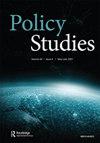监管在线平台上误导性的政治广告:数字政策中监管重商主义的一个例子
IF 2.3
4区 管理学
Q2 PUBLIC ADMINISTRATION
引用次数: 0
摘要
自发布《关于混合威胁的联合通报》以来,欧盟已公开认识到旨在破坏其合法性的非传统手段对其安全构成的风险。包括误导性政治广告在内的虚假信息的传播是一个重要例子,表明欧盟委员会对欧盟在地缘政治不稳定时期易受混合威胁的看法正在影响其监管政策。本文使用监管重商主义的框架,该框架认为,在感知到脆弱性的情况下,类似国家的行为体将基于安全逻辑,在以前以自我监管制度为特征的领域重申监管控制。本文考虑了欧盟委员会2019-2024年的优先事项,以及技术、安全和民主政策领域如何相互交叉,以应对混合威胁。因此,欧盟的在线平台治理正在进行重大重组,从自我监管体系转向以制裁为支撑的联合监管体系,作为打击在线混合威胁的一种手段。欧盟委员会在数字主权议程背景下从平台手中“收回控制权”,是数字政策中监管重商主义的一个例子,该政策认为,欧盟委员会寻求加强监管力度,以应对其感知到的脆弱性。本文章由计算机程序翻译,如有差异,请以英文原文为准。
Regulating misleading political advertising on online platforms: an example of regulatory mercantilism in digital policy
Since its Joint Communication on Hybrid Threats, the EU has publicly recognized the risks to its security posed by non-traditional means aimed at undermining its legitimacy. The propagation of disinformation including misleading political advertising serves as a key example of how the Commission’s perception of the EU’s vulnerability to hybrid threats in times of geopolitical instability is shaping its regulatory policies. This article uses the framework of regulatory mercantilism, which argues that in conditions of perceived vulnerability, a state-like actor will reassert regulatory control based on a security logic in areas previously characterized by self-regulatory regimes. This article considers the Commission’s 2019–2024 priorities, and how the spheres of technology, security, and democracy policies are intersecting as a response to hybrid threats. As a result, online platform governance in the EU is being substantially restructured with a move from systems of self-regulation to co-regulation backed by sanction as a means of combating hybrid threats online. The Commission’s “taking back control” from platforms in the context of a digital sovereignty agenda serves as an example of regulatory mercantilism in digital policy, which sees the Commission seek to promote regulatory strength in response to perceived vulnerability.
求助全文
通过发布文献求助,成功后即可免费获取论文全文。
去求助
来源期刊

Policy Studies
PUBLIC ADMINISTRATION-
CiteScore
5.40
自引率
4.50%
发文量
34
期刊介绍:
These changes at the structural level of the global system have impacted upon the work of public organizations either directly or indirectly and have broadened the field of action in policy studies. It has five main areas of intellectual interest: 1.To broaden the lens of policy analysis through the publication of research which locates policy-making within a theoretical, historical or comparative perspective. 2.To widen the field of enquiry in policy analysis through the publication of research that examines policy issues in a British, comparative, international or global context. 3.To promote constructive debate on theoretical, methodological and empirical issues in policy analysis.
 求助内容:
求助内容: 应助结果提醒方式:
应助结果提醒方式:


